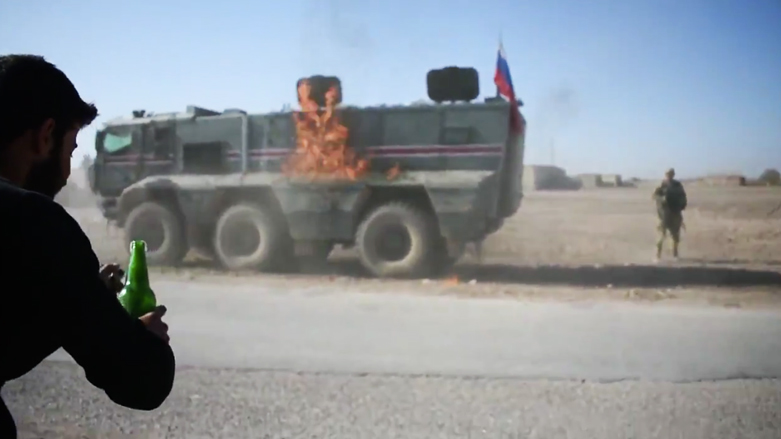After protestors target Russian troops in Syria, local officials say they will intervene

ERBIL (Kurdistan 24) – Following an incident on Monday where angry civilians hurled stones and Molotov cocktails at a joint Russian-Turkish patrol in Syria’s Kurdish region of Kobani, the local autonomous administration announced its forces would intervene to prevent future such incidents.
Footage circulated by the Rojava Information Centre showed escalating anger against the patrols, with protesters attacking Russian armored vehicles.
Asayish (internal security) in Kobane have released a statement condemning "stone-throwing and molotov cocktails" by civilian protesters against Russian vehicles patrolling the border:
— Rojava Information Center (@RojavaIC) November 21, 2019
"The Russian patrol's exposure to this incident is very regrettable... pic.twitter.com/vd7EYpIieL
“The Russian patrol’s exposure to this incident is very regrettable, and we will take the necessary measures [to] prevent such incidents,” the command of the internal security forces in Kobani said in a statement the next day, without mentioning the Turkish armored vehicles that were also part of the convoy.
“We believe the Russian forces’ deployment to the city of Kobani and the border strip, in accordance with the Sochi Agreement, is a guarantee to bring stability and security to the region,” the statement added.
“The internal security forces in the city of Kobani and other areas will continue to enforce and maintain law, and protect the security and safety of civilians from all that would destabilize this.”
Moscow-linked media called the incident, which occurred during the eighth Russian-Turkish patrol, “a provocation.”
Russian Foreign Minister Sergey Lavrov said on Wednesday that the Russian-Turkish Memorandum of Oct. 22, signed in Sochi by Russian President Vladimir Putin and Turkish President Recep Tayyip Erdogan, “involves withdrawing the Syrian Democratic Forces and military equipment to 30 kilometres from the Turkish-Syrian border.”
This deal also outlines joint Turkish-Russian patrols in a 10-kilometer-wide strip of land along the border that began on Nov. 1 and which protestors among local Kurdish populations have pelted with rocks and other objects in both Hasakah province and Kobani. So far, 13 joint patrols have been carried out.

Thomas McClure, a Syria-based researcher at the Rojava Information Center, told Kurdistan 24 that “the Autonomous Administration’s position is that Russia must play a role as a guarantor to ensure the safety and peaceful existence of its civilian population on the border.”
“While Russia has been criticised by officials here for failing to fulfill this role and allowing Turkish aggressions to continue – with civilians killed in a Turkish drone strike just last night – these joint patrols are one mechanism by which they hope to ensure an end to Turkish aggressions.”
At the same time, there is immense local anger against Turkey following the invasion that began on Oct. 9 which has killed hundreds and left hundreds of thousands displaced, the researcher added.
“By putting the focus on Russia, the Asayish [Kurdish security] perhaps wish to emphasize the peace-making role that Russia should be playing in the border regions, while acknowledging legitimate local anger and right to protest against the Turkish forces responsible for the latest crisis.”
Editing by John J. Catherine
